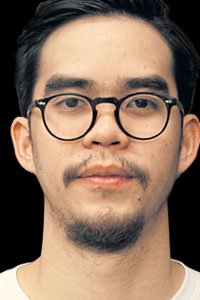Today is Father's Day, so it's natural that I talk about my dad. But there's really nothing to say about him other than he just made me a pot pie with extra quail eggs this morning, and is now, as you are reading this, probably swimming to Bee Gees tunes on a Sony waterproof MP3 player he just bought.
For the past 25 years of my life, I have never once seen him go out with friends. It's not that he doesn't have any, he probably just made up his own definition of what it is to be a dad. And for that, my brothers and I are forever grateful. Happy Father's Day to you.
That's all there is to it about my father, really. And since there are more stories out there worth telling than mine, I figured it would be nice to share one of them here with you.
It's a story of a friend of a friend. We met at Foodland, IT Square branch, on Wednesday at 8.30pm and talked for about an hour over a pitcher of Heineken. Three years ago his father was arrested and sentenced to 11 years in prison for a crime he, I and many in this society think is greatly unjust and outrageous. Let's leave it at that.
"He was arrested for other allegations before so I didn't think it was going to be this serious. It took some time for me to take it all in.
"The first thing that came to mind was that I had to bail him out."
His father was a magazine editor, and since the 2006 coup had been so deeply involved in politics that he hardly saw his son. The young man was in his second year of university at the time of his father's arrest and was taking part in a university club activity. Then
a friend of his father called.
"It's difficult to talk about my relationship with my father. I'm not really close to him. Our family is different from others. We don't show affection to one another, there is no kissing or hugging. I must have feelings, but I don't know how to describe them."
He was never into politics before this big turning point in life; he didn't even know exactly how his father had been involved in politics. But since then, he has led a series of campaigns to help his father.
"I can't say that I'm doing this for him 100%. This is the most honest interview I've given in two years. The motive is mixed; I also feel that this law needs to change. I can't say how I feel towards him, I just think that I need to do this as a son and a fellow human being. It's agonising that someone has to go through something like this.
"If your father was in jail and I asked you how you felt, what would you say? For me, I'm saying that because I'm his son I have to do this, no more, no less. You can call that love,
I guess. I'm trying to think how I feel, but I can't. When I visited him, he asked what faculty I was in. I was already in my second year when I visited him in prison but he never knew."
Over the last two years, his life has changed dramatically. Because of the campaigns and other responsibilities he has had to take up, he's done worse in his studies. The friends he now hangs out with are also a completely different group of people.
"In most job interviews that I've been to, they always asked about my father.
I don't know if that had anything to do with their rejections. One interviewer, after knowing who my father is, asked me if I would complain or protest if there was a law that's unjust. That's pretty obvious how that person felt towards what I'm going through. The company I work with now is managed by a foreigner, so that doesn't matter."
Ironically, since my friend's father was sent to prison, they have talked more that they have in years. Prior to his incarceration, his father spent most of the time working in his room.
"Since the 2006 coup, I don't believe we spent more than 20 minutes talking per week. Now I visit him every one or two weeks. It's funny that this law has made us talk more."
In the early stages, he believed that bailing his father out was possible. As time passed, he realised it was hopeless.
"I'm disappointed because I can't really help him, despite all these campaigns. Sure, some people, the foreign media, recognised what I did, but that was about it. The hope in seeing my father being free again lies in the direction society is moving and in how much more democratic we have all become. But everything has recently gone down, the issue of my father was buried deep and all that I have fought for doesn't mean anything."
Before he left I asked him what he would be doing for Father's Day.
"If the prison opens for visitors, I will go visit him."
Kaona Pongpipat is a writer for Life section of the Bangkok Post
